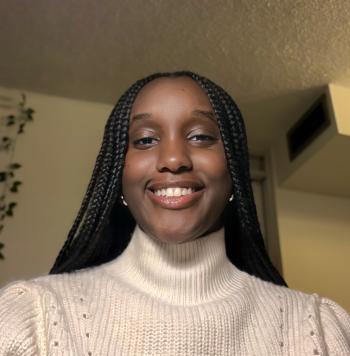
The Department of Health and Society congratulates the winner of this year’s Essay Award, Francine Gasasira!
Francine is a second-year student majoring in Population Health and a double minor in Psychology and Applied Statistics.
The DHS Essay Award invites Black students in the department to submit essays on selected topics in Black health. Francine’s essay examines research into breast cancer among Black women by McMaster University Professor Juliet Daniel.
“Receiving this award fills me with so much joy and gratitude,” says Francine. “In doing this research, I realized that we can all use our skills to ignite change and solve problems in our world, just like Dr. Juliet Daniel did with her scientific discovery. I believe that it is imperative to recognize the disparities that exist in our world and use any expertise we may have to fill in those gaps. I now feel more empowered to do further research in the health sciences and use my findings to improve the lives of others.”
You can read Francine’s winning essay below.
Dr. Juliet Daniel’s Breast Cancer Research: Addressing Urgent Needs in Black Health
Breast Cancer
Data reveals that breast cancer is the most common cancer among women, affecting millions around the world[1]. In Canada, breast cancer ranks as the second most prevalent cancer with approximately 1 in 8 women receiving a diagnosis in their lifetime[1]. Although the survival rates for this illness have significantly increased, there are still disparities regarding access to care, treatment efficacy and survival outcomes[2]. This essay will specifically explore a form of breast cancer that disproportionately affects Black women and analyze the implications of the ground-breaking research regarding this matter.
Research shows that Black women are less likely to develop breast cancer compared to their Caucasian counterparts[3]. However, in the instances when they do, Black women tend to develop triple negative breast cancer (TNBC)[3]. This subtype of breast cancer is very aggressive, tends to spread to important organs very quickly and has the lowest survival rate when compared to other forms of breast cancer[3]. It is also most prevalent in young Black women[1]. This discovery led Dr. Juliet Daniel, a lead researcher at McMaster University, to conduct research that will allow scientists and doctors to better understand, prevent and treat this form of breast cancer, which would ultimately save millions of lives[3].
Ground-breaking Discovery: Kaiso Gene
Existing research hypothesized that Black women developed TNBC more than Caucasian women because of the social determinants of health, such as socioeconomic status[4]. However, Dr. Daniel hypothesized that the high incidence of TNBC among Black women could be attributed to genetics[4]. In 1999, she discovered a gene that she named Kaiso and in 2012, she found that the expression of this gene was higher in the breast cancer tissues of Black when compared to those of Caucasian women[3]. The Kaiso gene has also been found to be a key contributor to the spread of TNBC to the rest of the body[3]. Lastly, women who had a high expression of Kaiso, were less likely to survive from breast cancer[3].
Implications for Black Health
The discovery of the Kaiso gene and how it is expressed differently by different women with breast cancer is extremely remarkable. It gives cancer researchers all around the world a better understanding of why Black women are affected differently by breast cancer. It also explains why Black women have lower survival rates than White women when diagnosed with breast cancer. Furthermore, it brings researchers, such as Dr. Daniel, one step closer to discovering how to prevent or even develop a more targeted treatment for TNBC and prevent it from spreading to other organs. Although, women are still dying from TNBC, this discovery has laid the foundation for future breast cancer research, especially among Black women. Lastly, this discovery is very encouraging to many Black and female scientists around the world, as Dr. Daniel must have inspired them to take up space in Science and make their mark.
References
- Public. Breast cancer - Canada.ca [Internet]. Canada.ca. 2022 [cited 2024 Apr 12]. Available from: https://www.canada.ca/en/public-health/services/publications/diseases-conditions/breast-cancer.html
- BioMark Diagnostics Inc. Revolutionizing Cancer Research: Meet Dr. Juliet Daniel, the Trailblazing Black Scientist Making a Difference in the Lives of Triple Negative Breast Cancer (TNBC) Patients - Biomark Diagnostics [Internet]. Biomark Diagnostics. 2023 [cited 2024 Apr 12]. Available from: https://www.biomarkdiagnostics.com/revolutionizingcancer-research-meet-dr-juliet-daniel-the-trailblazing-black-scientist-making-a-difference-in-the-lives-of-triplenegative-breast-cancer-tnbc-patients/
- Canada,. Passion and persistence: How fundamental research is addressing an aggressive breast cancer – CIHR [Internet]. Cihr-irsc.gc.ca. 2020 [cited 2024 Apr 12]. Available from: https://cihr-irsc.gc.ca/e/53154.html
- Biologist Juliet Daniel named one of Canada’s top Black innovators in research and medicine [Internet]. Mcmaster.ca. 2024 [cited 2024 Apr 12]. Available from: https://brighterworld.mcmaster.ca/articles/juliet-daniel-cipo-top-blackinnovator-research-medicine/